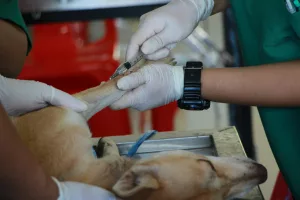Howling is a behavior deeply ingrained in the canine species, with roots tracing back to their wild ancestors like wolves. While not all dogs howl, those that do engage in this behavior for a variety of reasons. Whether it’s to communicate with other dogs, express emotions, or respond to environmental triggers, howling serves multiple purposes in the life of a dog. In this article, we’ll explore the different reasons why dogs howl, what it means, and whether you should be concerned about your dog’s howling behavior.
The Origins of Howling in Dogs
To understand why dogs howl, it’s important to consider their ancestry. Domestic dogs are descendants of wolves, and howling is a primary form of communication among wolf packs. For wolves, howling serves several purposes, including marking territory, coordinating pack activities, and locating other members of the group. While domesticated dogs have evolved away from their wild roots in many ways, the instinct to howl remains a part of their behavior.
Common Reasons Why Dogs Howl
There are several reasons why dogs howl, ranging from communication to expressing emotions or responding to specific stimuli. Let’s explore some of the most common causes:
1. Communication and Alerting the Pack
In the wild, wolves howl to communicate with other members of their pack, especially over long distances. Similarly, domestic dogs may howl as a way of communicating, either with other dogs or with humans. This communication could be an alert, a way of drawing attention to themselves, or even a form of bonding.
For instance, if your dog hears other dogs howling in the neighborhood or a siren in the distance, they may join in as a way of signaling their presence. Dogs also howl to alert their family members (human or animal) to a perceived threat or simply to announce their location.
2. Response to High-Pitched Sounds
Dogs are highly sensitive to certain sounds, especially those that are high-pitched. Sirens, musical instruments, and even the sound of a person singing or playing a specific note can trigger a howling response. This behavior is similar to how wild canines howl in response to the calls of their pack members. For some dogs, howling when they hear these sounds is an instinctual reaction, as if they’re trying to “join the chorus.”
3. Separation Anxiety
One of the more concerning reasons dogs howl is due to separation anxiety. Dogs are social animals, and when they are left alone for extended periods, some may experience stress and anxiety. Howling can be a manifestation of this distress. Dogs with separation anxiety might howl, whine, or bark excessively when their owner is away as a way of calling out for them. This type of howling is often accompanied by other anxious behaviors, such as pacing, destructive chewing, or urinating in the house.
4. Attention-Seeking Behavior
Sometimes, dogs howl simply to get attention. If a dog learns that howling brings their owner’s attention—whether it’s positive or negative—they may repeat the behavior to get the desired result. For example, if you rush to comfort or scold your dog every time they howl, they may associate howling with getting your attention and continue doing it whenever they feel ignored.
5. Expressing Emotions
Dogs use howling as a way of expressing their emotions, whether they’re feeling lonely, excited, or distressed. Just like barking or whining, howling is one of the vocalizations dogs use to communicate how they feel. A lonely dog might howl to express sadness when they’re by themselves, while an excited dog might howl when they anticipate something enjoyable, like a walk or car ride.
6. Territorial Defense and Warning Signals
Howling can also be a way for dogs to assert their territory. In the wild, wolves howl to warn off other packs or animals encroaching on their territory. Domesticated dogs may howl for similar reasons, especially when they perceive an unfamiliar presence near their home. This could be triggered by the sight of a stranger approaching the property, the sound of unfamiliar footsteps, or even the presence of another animal.
7. Medical Issues or Pain
In some cases, excessive or unusual howling could indicate that a dog is in pain or discomfort. Dogs might howl to express physical distress, whether it’s due to an injury, illness, or other underlying medical condition. If your dog suddenly starts howling frequently and there is no clear trigger, it’s a good idea to consult your veterinarian to rule out any potential health problems.
8. Environmental Triggers and Conditioning
Dogs can be conditioned to howl in response to specific stimuli, especially if howling has been reinforced by certain events. For example, if your dog howls when you play a certain song, and you respond with attention or excitement, they may learn to repeat that behavior whenever they hear that song or similar sounds. Over time, dogs can become conditioned to howl in response to certain triggers, whether it’s music, sirens, or even specific words or phrases.
9. Celebratory or Playful Howling
Some dogs howl when they’re feeling playful or excited. For instance, dogs may howl during playtime, when they’re excited to go on a walk, or when they’re reunited with their owners after being apart. This type of howling is usually accompanied by other playful behaviors, like tail wagging, jumping, or running in circles.
10. Breed-Specific Traits
Certain dog breeds are more prone to howling than others. Breeds that are closely related to wolves, such as Siberian Huskies, Alaskan Malamutes, and other spitz-type dogs, are known for their howling tendencies. Hound breeds, like Beagles and Bloodhounds, also have a natural inclination to howl, as this was historically used during hunting to signal the location of prey. If you have a breed that’s naturally predisposed to howling, it’s likely that this behavior is simply part of their genetic makeup.
Should You Be Concerned About Your Dog’s Howling?
In most cases, howling is a normal behavior and not something to be overly concerned about. However, there are certain situations where excessive howling could indicate a problem:
- Sudden Onset of Howling: If your dog suddenly starts howling more frequently or intensely, it could be a sign of distress, pain, or anxiety.
- Separation Anxiety: If your dog howls excessively when left alone, they may be experiencing separation anxiety, which can lead to destructive behaviors and affect their well-being.
- Medical Concerns: If your dog’s howling is accompanied by other symptoms, such as limping, lethargy, or changes in appetite, it’s important to consult a veterinarian to rule out any health issues.
How to Manage and Reduce Howling
If your dog’s howling is becoming disruptive or if it’s a sign of anxiety, there are steps you can take to manage the behavior:
1. Identify the Trigger
The first step in managing howling is to identify the trigger. Is your dog howling in response to a specific sound, out of boredom, or due to anxiety? Understanding the cause will help you determine the best approach to address the behavior.
2. Provide Mental and Physical Stimulation
Dogs that are bored or under-stimulated are more likely to howl out of frustration. Ensuring that your dog receives enough exercise, playtime, and mental stimulation can help reduce excessive howling. Interactive toys, puzzle feeders, and regular walks can keep your dog engaged and less likely to howl out of boredom.
3. Use Positive Reinforcement Training
If your dog howls to get attention or in response to specific triggers, you can use positive reinforcement training to redirect the behavior. Reward your dog when they remain quiet in situations that would normally cause them to howl. Gradually, your dog will learn that staying calm and quiet leads to positive outcomes, while howling does not.
4. Address Separation Anxiety
If separation anxiety is the cause of your dog’s howling, gradual desensitization can help. Start by leaving your dog alone for short periods and gradually increase the time. Providing comfort items, like a blanket that smells like you or a treat-dispensing toy, can help ease their anxiety. In severe cases, you may need to consult a professional dog trainer or behaviorist.
5. Minimize Environmental Triggers
If your dog howls in response to specific sounds, such as sirens or alarms, try to reduce their exposure to these triggers. You can also use desensitization techniques by gradually exposing your dog to the sound at a low volume while rewarding calm behavior, helping them become less reactive over time.
6. Consult a Veterinarian
If you suspect that your dog’s howling is due to pain or a medical issue, it’s important to seek veterinary advice. Treating any underlying health conditions can help alleviate the behavior.
Conclusion
Howling is a natural and instinctual behavior for dogs, rooted in their ancestry as pack animals. While it can be a form of communication, an expression of emotions, or a response to certain stimuli, it’s usually not a cause for concern. However, if your dog’s howling becomes excessive or is accompanied by other signs of distress, it’s essential to investigate the cause and take appropriate steps to manage the behavior.
By understanding why your dog howls and addressing any underlying issues, you can ensure that both you and your dog live harmoniously, with howling being a fun and occasional expression rather than a disruptive habit. Whether it’s a joyful howl of excitement or a call for attention, this vocalization is just one of the many ways dogs communicate and express themselves.




